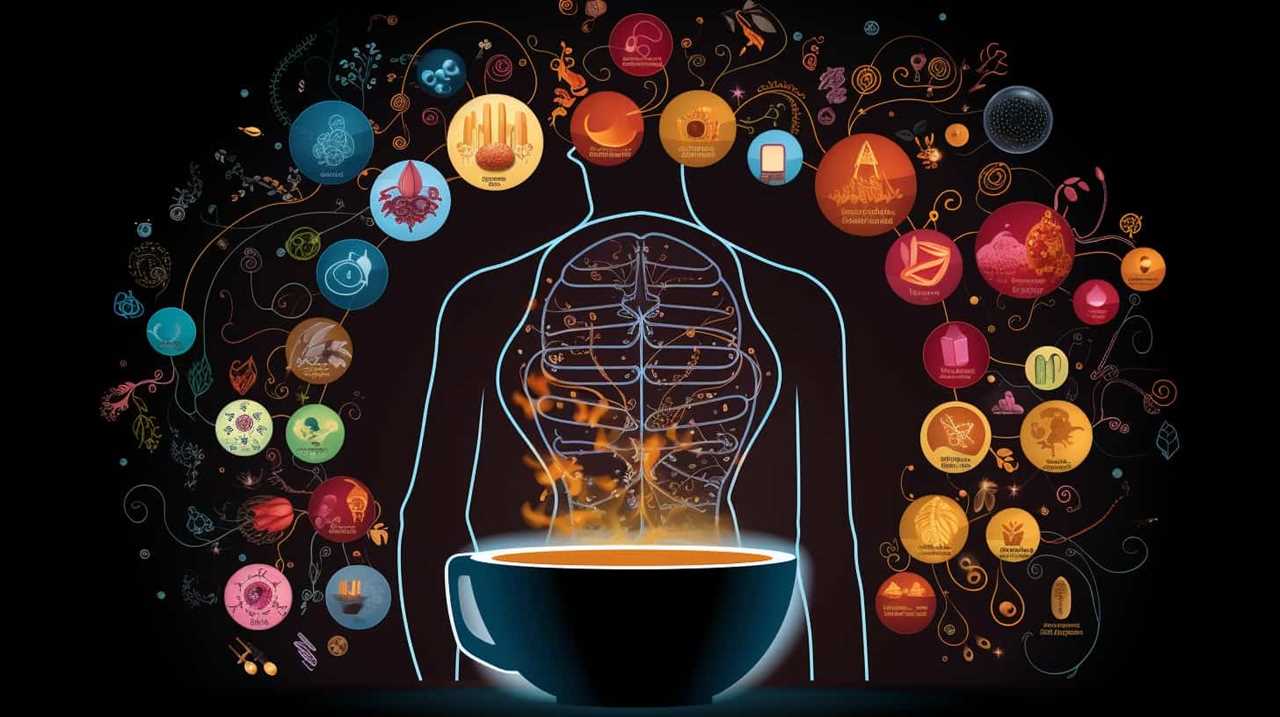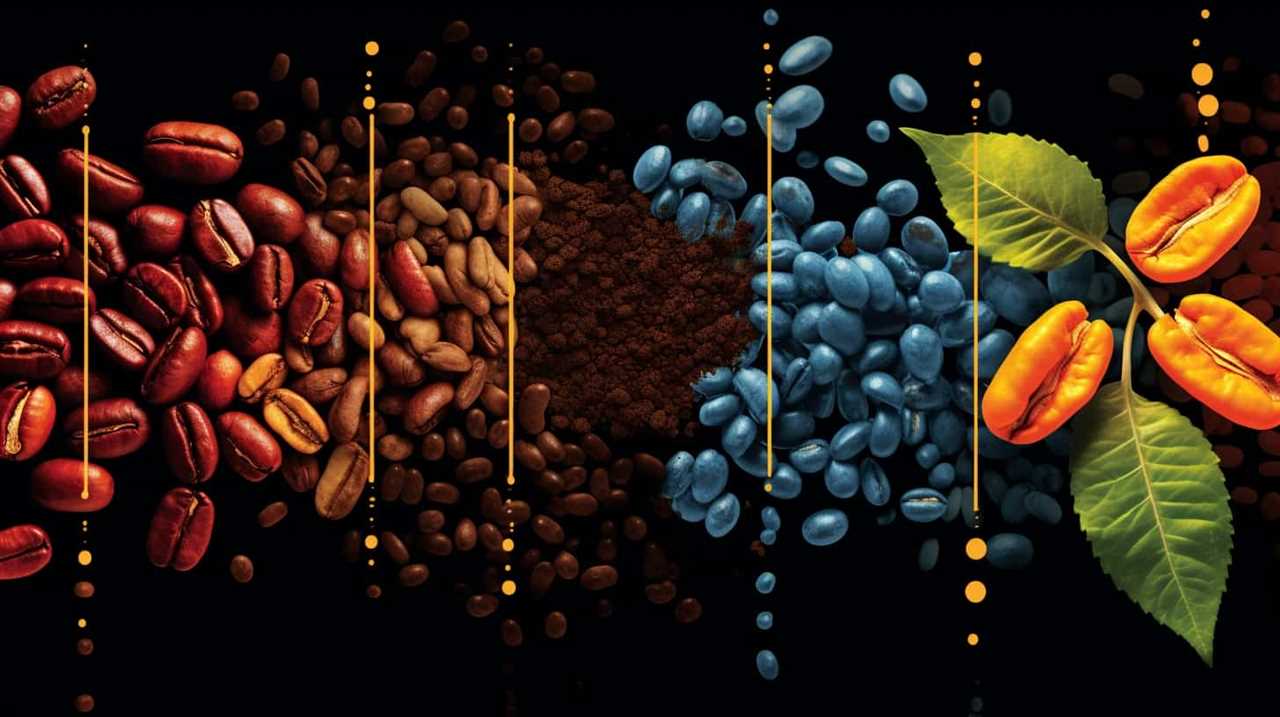Coffee, Tea and Alternatives and Health plus Fitness
Dunkin Iced Coffee: High Caffeine Content And Health Risks

I can’t live without my daily dose of caffeine, and Dunkin iced coffee is my go-to pick-me-up. But did you know that this popular beverage contains a high amount of caffeine that can pose health risks if consumed excessively? As a coffee addict, this fact made me curious about the science behind caffeine and its effects on our bodies.
If you’re like me and love your Dunkin iced coffee, you might want to pay attention to the caffeine content and the potential health risks associated with excessive consumption. In this article, we’ll explore the basics of caffeine, how to understand its content in Dunkin iced coffee, and alternative beverage options that are healthier and lower in caffeine.
So grab your favorite mug and let’s dive in!
Key Takeaways
- Dunkin iced coffee has high caffeine content that varies depending on size and added sugars/flavors. A small size contains approximately 150mg of caffeine, while the maximum amount of caffeine in one serving is about 500mg (not recommended).
- Caffeine is a psychoactive substance found in many foods and drinks that can have positive effects on alertness, thinking, and athletic performance in moderate doses. However, excessive consumption can lead to sleep issues, anxiety, and heart problems.
- Pregnant women and children under 12 years have lower recommended daily limits of caffeine intake, and it’s wise to check with a doctor before consuming large amounts of caffeine.
- Switching to low-caffeine or caffeine-free alternatives, such as herbal tea, low-caffeine iced tea, and fruit juice blends, can provide benefits such as less caffeine, healthier choices, eco-friendliness, and tastier and higher quality drinks.
Caffeine Basics
I know that caffeine is a psychoactive substance found in many foods and drinks, and understanding its basics is essential for making informed decisions about my Dunkin iced coffee consumption and potential health risks.
Caffeine metabolism varies from person to person, but the general rule is that it takes between 4 to 6 hours for half of the caffeine to leave your body. This means that if I consume a small Dunkin iced coffee with approximately 150mg of caffeine at 10 am, by 2 to 4 pm, half of that caffeine will still be in my body. It’s important to keep this in mind when deciding how much caffeine to consume throughout the day, especially if I’m sensitive to caffeine or have sleep issues.
Caffeine is also known to enhance exercise performance by increasing alertness, reducing fatigue, and improving endurance. However, the benefits of caffeine for exercise may vary depending on factors such as the type of exercise, the duration of exercise, and individual caffeine sensitivity.
It’s crucial to consider my personal caffeine tolerance and the type of exercise I plan to do before consuming caffeine. Too much caffeine before exercise can lead to negative side effects like jitteriness, dehydration, and increased heart rate.
Understanding Caffeine Content
Knowing the caffeine levels in your favorite drinks is crucial for making informed decisions about your daily intake and potentially avoiding negative effects. Understanding the caffeine content of Dunkin iced coffee can help you determine how much you should consume to avoid any health risks. As mentioned earlier, Dunkin iced coffee contains high levels of caffeine, ranging from approximately 150mg to a maximum of 500mg per serving.
To help paint a clearer picture, here is a table showing the caffeine content of different Dunkin iced coffee sizes and flavors, as well as the recommended daily caffeine intake for pregnant women:
| Drink Size | Caffeine Content (mg) | Recommended Daily Caffeine Intake for Pregnant Women (mg) |
|---|---|---|
| Small (12 oz) | 150 | 0 |
| Medium (16 oz) | 206 | 0 |
| Large (24 oz) | 310 | 0 |
| Extra Large (32 oz) | 413 | 0 |
It’s important to note that pregnant women should avoid excessive caffeine consumption to prevent miscarriage or low birth weight babies. The recommended daily caffeine intake for pregnant women is less than 200mg per day. Therefore, if you’re pregnant and craving a Dunkin iced coffee, it’s best to stick to the small size or opt for a decaf version. Understanding the caffeine content of your favorite drinks can help you make better decisions about your caffeine consumption and prevent any potential health risks.
Alternatives and Benefits
Exploring alternatives to my usual Dunkin iced coffee can provide a variety of benefits. One of the most significant benefits is the ability to reduce my caffeine intake. While caffeine can provide a boost of energy and help with alertness, excessive consumption can lead to negative effects such as sleep issues and anxiety.
Switching to low-caffeine or caffeine-free beverages such as herbal tea, low-caffeine iced tea, or fruit juice blends can still provide refreshing and flavorful options without the added caffeine. In addition to reducing caffeine intake, seeking eco-friendly options and flavorful substitutions can enhance my overall experience.
Adding coconut or almond milk to my beverage can provide a unique taste and texture, while also making it more environmentally friendly. Understanding the basics of caffeine content and its effects on the body can allow for informed choices when exploring alternatives. By trying out different options and exploring the benefits they provide, I can create a healthier and more enjoyable caffeine consumption routine.
Frequently Asked Questions
Does the caffeine content in Dunkin iced coffee vary based on the type of beans used?
Oh boy, let’s talk about the caffeine content in Dunkin iced coffee! I know what you’re thinking, ‘Oh great, another lecture on why I shouldn’t drink too much caffeine.’ But hold on, I’m not here to rain on your caffeinated parade.
I’ve got some interesting info for you. You see, the caffeine content in coffee can vary based on factors like bean varieties and roasting methods. So to answer the question, yes, the caffeine content in Dunkin iced coffee can vary based on the type of beans used and how they’re roasted.
However, it’s important to note that Dunkin, like most cafes, serves standardized amounts of coffee regardless of bean type or roast level. So while the caffeine content can vary from bean to bean, you’ll still get a similar amount of caffeine in your cup no matter what.
But hey, if you’re a coffee connoisseur, maybe it’s worth exploring the different bean varieties and roasting methods to see if you can taste a difference. Just remember, moderation is key when it comes to caffeine consumption.
Can adding sugar or cream to Dunkin iced coffee affect its caffeine content?
I’ve always been curious about whether adding sugar or cream to my Dunkin iced coffee affects its caffeine content.
After doing some research, I found that the caffeine content in coffee generally doesn’t change based on the addition of sugar or cream. However, it’s important to note that adding these additives can increase the caloric content of the drink, which can lead to weight gain and other health issues.
It’s also worth mentioning that some flavored syrups and creamers may contain additional caffeine, so it’s important to read the label and be aware of the total caffeine content.
Ultimately, while sugar and cream may not affect the caffeine content of your Dunkin iced coffee, it’s important to consider the potential health risks associated with these additives.
How does the caffeine content in Dunkin iced coffee compare to other Dunkin beverages?
Iced coffee alternatives offer health benefits with lower caffeine content compared to Dunkin’s other beverages. As someone who enjoys a good caffeine kick, I’m always on the lookout for alternatives that are both tasty and healthy.
Dunkin’s iced coffee has a high caffeine content, but switching to alternatives such as low-caffeine iced tea or fruit juice blends can provide benefits like fewer caffeine jitters, a healthier choice, eco-friendliness, and tastier and higher quality drinks.
Understanding the basics of caffeine content in different beverages allows for informed choices about consumption, and exploring every point is necessary for comprehension.
So, next time you’re at Dunkin, why not try something new and explore the health benefits of their iced coffee alternatives?
Is it safe to consume Dunkin iced coffee while pregnant or breastfeeding?
As a pregnant or breastfeeding individual, it’s important to be mindful of the potential risks associated with consuming high levels of caffeine.
While Dunkin iced coffee contains more caffeine than other Dunkin beverages, it’s generally safe to consume in moderation.
However, excessive caffeine intake can have negative effects on fetal development and may also impact milk supply.
It’s recommended to limit caffeine intake to 200-300mg per day during pregnancy and breastfeeding.
It’s always best to consult with a healthcare provider to determine what level of caffeine intake is safe for you and your baby.
Does the caffeine content in Dunkin iced coffee vary by location or region?
From my personal experience, I’ve found that the caffeine content in Dunkin iced coffee can vary by location or region. This may be due to differences in consumer preferences or the availability of certain ingredients.
For example, I’ve noticed that some locations offer a wider variety of flavors or syrups, which can affect the caffeine content. Additionally, the size of the cup may also vary by location, which can impact the overall caffeine content.
While there may be some regional variations, it’s important to note that Dunkin generally serves a high-caffeine drink compared to other coffee chains. As with any caffeinated beverage, it’s important to be aware of the potential health risks and to consume in moderation.
Conclusion
Overall, while Dunkin iced coffee can be a delicious and refreshing treat, it’s important to be mindful of its high caffeine content and potential health risks. As someone who enjoys a good cup of coffee, I understand how tempting it can be to indulge in a caffeine boost, but it’s important to remember that moderation is key.
Fortunately, there are plenty of alternative beverage options available for those looking for a healthier and lower-caffeine alternative. Whether it’s herbal tea, fruit-infused water, or a simple glass of milk, there are plenty of delicious and refreshing options to choose from.
So next time you’re looking for a cold and energizing drink, consider reaching for a healthier option that won’t leave you feeling jittery or anxious. After all, a little self-care can go a long way in helping you feel your best.
Noah, the Editor-in-Chief at Cappuccino Oracle, plays a pivotal role in shaping the voice and vision of our renowned platform. With an unwavering passion for coffee, coffee alternatives, and tea, Noah leads Cappuccino Oracle towards new horizons in the realm of coffee journalism.
Beyond his professional responsibilities, Noah serves as a mentor and guiding force for his team. His dedication to journalistic excellence and genuine love for coffee, coffee alternatives, and tea continue to inspire and motivate the Cappuccino Oracle family. In the ever-evolving world of these beverages, Noah’s leadership ensures that our platform remains at the forefront, delivering enlightening and enjoyable content to our readers worldwide.
Coffee, Tea and Alternatives and Health plus Fitness
Picking the Perfect Perk-Me-Up: Top 10 Times to Drink Coffee for a Metabolism Boost"

As someone who loves coffee, I am constantly on the lookout for the best moments to savor my favorite drink. If you share my enthusiasm, you’ll be thrilled to discover the top 10 times to have coffee for a metabolism boost.
From jumpstarting your morning to powering through workouts and overcoming afternoon slumps, this article will guide you on when to sip that delicious cup of joe to maximize your energy levels and rev up your metabolism.
Let’s dive in and discover the perfect perk-me-up!
Key Takeaways
- Drinking coffee in the morning provides an energy boost, revs up metabolism, and helps burn more calories at rest.
- Consuming coffee as a pre-workout power-up enhances endurance, focus, and overall performance, leading to increased calorie burn.
- Prioritizing proper nutrition, hydration, and rest contributes to maximizing workout performance and increasing endurance.
- Drinking coffee during mid-morning and afternoon hours improves alertness, cognitive function, and metabolism, helping to combat the afternoon slump and keep energy levels up.
First Thing in the Morning
I always have a cup of coffee first thing in the morning to kickstart my day. Not only does it help me wake up and feel more alert, but it also has some great benefits for my metabolism throughout the day.

The science behind morning coffee and its metabolism boost lies in its caffeine content. Caffeine stimulates the nervous system and increases the production of adrenaline, which can increase your metabolic rate. This means that your body burns more calories even at rest. Additionally, coffee has been shown to improve insulin sensitivity, which can help regulate blood sugar levels and prevent weight gain.
So, starting your day with a cup of coffee can’t only give you that much-needed energy boost, but also help rev up your metabolism for the day ahead.
Now, let’s move on to the next section and discover the benefits of coffee as a pre-workout power-up.
Pre-Workout Power-Up
Before hitting the gym, I always make sure to power up with a cup of coffee. The caffeine in coffee acts as a natural stimulant, giving me the energy boost I need to push through my workouts.

Not only does it help increase my endurance and focus, but studies have also shown that pre-workout caffeine intake can enhance overall performance and help burn more calories.
Coffee for Energy
The caffeine in a cup of coffee is a great way to boost energy levels before a workout. When it comes to pre-workout fuel, coffee has been shown to have numerous benefits. Not only does it provide an energy boost, but it can also improve focus and increase endurance. Studies have found that caffeine can enhance athletic performance by reducing perceived exertion and increasing fat oxidation.
Additionally, coffee has been shown to improve muscle recovery post-exercise. It’s important to note that individual tolerance to caffeine varies, so it’s best to experiment and find the right amount that works for you. Aim to consume your coffee about 30 minutes to an hour before your workout for optimal effects. Remember to hydrate properly and listen to your body during exercise.
Pre-Workout Caffeine Benefits
Drinking a moderate amount of caffeine before my workout provides significant benefits to my energy levels and performance. Research shows that consuming caffeine before exercise can enhance both physical and mental performance. Here are four reasons why pre-workout caffeine can be beneficial:

-
Increased alertness: Caffeine stimulates the central nervous system, helping me feel more alert and focused during my workout.
-
Enhanced endurance: Caffeine has been found to improve endurance by reducing perceived exertion, allowing me to push through a tough workout.
-
Improved fat burning: Caffeine has been shown to increase fat oxidation, making it an effective tool for those looking to lose weight or improve body composition.
-
Reduced muscle pain: Caffeine has pain-relieving properties that can help reduce muscle soreness and perceived pain during and after exercise.

When it comes to caffeine dosage, it’s recommended to consume around 3-6 mg per kilogram of body weight, about 30-60 minutes before exercise. It’s important to note that individual tolerance may vary, so it’s best to start with a lower dose and gradually increase if needed. As with any supplement, it’s always a good idea to consult with a healthcare professional before making any changes to your routine.
Maximizing Workout Performance
To maximize my workout performance, I focus on fueling my body with nutritious foods and prioritizing hydration.
It’s important to provide our bodies with the right nutrients to support energy levels and muscle function during exercise. Eating a balanced meal that includes carbohydrates, protein, and healthy fats before a workout can help maximize performance by providing sustained energy.
Hydration is also crucial for optimal performance and workout recovery. Drinking enough water before, during, and after exercise helps maintain proper fluid balance, supports muscle function, and prevents dehydration.

Additionally, getting enough rest and sleep is essential for maximizing performance. Rest allows our bodies to recover and repair, leading to improved muscle strength and endurance.
Mid-Morning Boost
I can’t start my day without a cup of coffee to power through my mid-morning slump. Coffee has long been known for its ability to provide a much-needed energy boost, especially during those mid-morning hours when focus and concentration may start to wane.
Here are four reasons why coffee is the perfect pick-me-up during this time:
- Increased alertness: The caffeine in coffee stimulates the central nervous system, leading to increased alertness and enhanced cognitive function.
- Improved concentration: Studies have shown that coffee can improve focus and concentration, making it easier to tackle tasks and stay productive.
- Metabolism boost: Coffee has been found to increase metabolic rate, helping to burn more calories throughout the day.
- Mood enhancer: Coffee can also have a positive impact on mood, promoting feelings of happiness and well-being.
Afternoon Slump Buster
My go-to afternoon slump buster is a strong cup of coffee, and it never fails to give me the energy boost I need to power through the rest of the day.

However, I understand that not everyone is a coffee lover, and some may be looking for alternative ways to stay focused during the afternoon. Luckily, there are a few options that can provide a similar pick-me-up without the caffeine.
One alternative to coffee is green tea, which contains a moderate amount of caffeine and also provides antioxidants that can support brain health. Another option is matcha, a powdered form of green tea that delivers a more concentrated dose of caffeine and antioxidants.
Additionally, herbal teas like peppermint or chamomile can help relax the mind and improve focus without any caffeine.
So, whether you choose coffee or one of these alternatives, finding a way to combat the afternoon slump is essential for maintaining productivity and focus.

Now, let’s move on to the next topic: the post-lunch pick-me-up.
Post-Lunch Pick-Me-Up
After lunch, I often find myself feeling sluggish and in need of a pick-me-up. That’s when a post-lunch coffee comes to the rescue.
Not only does it provide a burst of energy, but research shows that drinking coffee after lunch can also boost afternoon productivity.
Energy After Lunch
The caffeine in a cup of coffee can provide an amazing energy boost after lunch. It’s no secret that many of us find ourselves in need of a pick-me-up during those post-lunch hours.

When it comes to finding alternative ways to boost our energy levels, there are a few options worth considering:
-
Green tea: With its lower caffeine content and high levels of antioxidants, green tea provides a more moderate and sustained energy boost.
-
Exercise: Engaging in physical activity, such as a brisk walk or stretching, can naturally increase your energy levels and help combat that mid-afternoon slump.
-
Hydration: Sometimes, all we need is a glass of water to rehydrate and refresh our bodies, which can help combat fatigue.

-
Healthy snacks: Opting for nutrient-dense snacks like fruits, nuts, or yogurt can provide a natural energy boost without the crash.
Boosting Afternoon Productivity
I find that taking a short power nap after lunch really boosts my afternoon productivity. Not only does it combat fatigue, but it also gives me a burst of energy and helps me stay focused for the rest of the day.
However, I’ve also discovered another technique that works wonders for boosting creativity and productivity in the afternoon: drinking a cup of coffee. Studies have shown that caffeine can enhance cognitive function and improve alertness, making it the perfect pick-me-up when you’re feeling sluggish.
Just be mindful of the timing, as consuming caffeine too late in the day can interfere with your sleep. So, before a study session or any task that requires mental sharpness, a cup of coffee can provide that extra boost to help you perform at your best.

Before a Study Session
Before starting a study session, I like to fuel up with a cup of coffee. It helps me stay focused and alert, giving me the boost I need to absorb information effectively. However, I understand that not everyone is a fan of coffee or may want to explore alternatives.
Here are some study strategies and coffee alternatives that can provide a similar energizing effect:
-
Green tea: Rich in antioxidants and containing a moderate amount of caffeine, green tea can provide a gentle boost without the jitters.
-
Herbal tea: Opt for caffeine-free herbal teas such as chamomile or peppermint, which can help calm the mind and increase focus.

-
Matcha: This powdered form of green tea is known for its high caffeine content and can provide sustained energy throughout your study session.
-
Dark chocolate: A small piece of dark chocolate can provide a mild stimulant effect and improve cognitive function.
Pre-Work Meeting Energizer
To boost productivity and focus during pre-work meetings, I like to incorporate a quick energizer activity that engages everyone and promotes creativity. One effective activity is a short mindfulness exercise. This can be as simple as closing our eyes and taking a few deep breaths, or doing a body scan to relax any tension.
Research has shown that mindfulness practices can enhance pre-workout focus and mental clarity. By taking a moment to ground ourselves and bring our attention to the present moment, we can clear our minds of distractions and improve our cognitive abilities. This can lead to better concentration, problem-solving skills, and overall performance during meetings.

Late Afternoon Revival
One of my favorite ways to experience a late afternoon revival is by savoring a refreshing iced coffee. It not only provides a delightful pick-me-up, but also boosts my energy and helps me stay focused for the rest of the day. Here are a few reasons why coffee is the perfect choice for late afternoon energy:
-
Caffeine content: Coffee contains caffeine, a natural stimulant that can increase alertness and reduce fatigue. It helps to combat the afternoon slump and keeps you energized.
-
Mental clarity: The caffeine in coffee can enhance cognitive function and improve focus. It helps to sharpen your mind and improve productivity during the late afternoon hours.
-
Taste and enjoyment: Drinking a delicious iced coffee can be a pleasurable experience that uplifts your mood and rejuvenates your senses.

-
Versatility: Coffee can be customized to suit your preferences. Whether you like it black, with milk, or flavored, there are endless options to enjoy your late afternoon cup of joe.
Before an Evening Workout
I often like to fuel up with a cup of coffee before my evening workout to give me that extra boost of energy. But does caffeine really have an impact on exercise performance in the evening? Research suggests that it does.
A study published in the Journal of Applied Physiology found that consuming caffeine before an evening workout can enhance exercise performance. Caffeine acts as a stimulant, increasing alertness and reducing the perception of effort during exercise. It also stimulates the central nervous system, leading to improved muscle contraction and endurance.
However, it’s important to note that the effects of caffeine can vary from person to person, so it’s best to experiment and see what works for you. Remember to consume caffeine in moderation and stay hydrated to optimize your performance and overall well-being.

Nighttime Productivity Enhancer
I’ve always wondered if having coffee at night could actually enhance productivity without disrupting sleep. Is it possible to find a balance between the benefits of caffeine and the need for quality sleep? And if so, what’s the optimal nighttime caffeine dosage to maximize productivity without sacrificing rest?
Let’s explore the effects of coffee on sleep quality and discover if there’s a way to boost productivity during nighttime hours.
Coffee Vs. Sleep Quality
The article explores the effects of coffee on sleep quality and its potential as a nighttime productivity enhancer. Coffee is a popular beverage that many people rely on to stay awake and alert during the day. However, consuming coffee too close to bedtime can disrupt sleep patterns and lead to sleep deprivation. It’s important to understand the impact of coffee on our sleep quality in order to make informed decisions about when to consume it.
Here are a few key points to consider:

- Coffee contains caffeine, a stimulant that can interfere with our ability to fall asleep and stay asleep.
- Consuming coffee several hours before bedtime may still have an impact on sleep quality and patterns.
- Individuals vary in their sensitivity to caffeine, so it’s important to pay attention to personal reactions.
- Opting for decaffeinated coffee or other non-caffeinated alternatives in the evening can help promote better sleep.
Considering the potential effects of coffee on sleep quality, it raises the question: what’s the optimal nighttime caffeine dosage?
Optimal Nighttime Caffeine Dosage?
An article suggests that finding the right amount of caffeine to consume at night for optimal productivity is a topic of discussion.
Nighttime caffeine consumption can have significant effects on sleep quality, making it essential to strike a balance.
Caffeine is a stimulant that can interfere with the sleep-wake cycle, causing difficulty falling asleep and reducing the overall quality of sleep.

It’s recommended to avoid consuming caffeine at least six hours before bedtime to minimize its disruptive effects.
However, individual tolerance to caffeine varies, and some people may be more sensitive to its effects than others.
It’s important to listen to your body and pay attention to how caffeine affects your sleep.
Experimenting with different cutoff times and observing the resulting sleep patterns can help determine the optimal nighttime caffeine dosage for you.

Frequently Asked Questions
Can Drinking Coffee in the Evening Affect My Sleep Quality?
Drinking coffee in the evening can affect my sleep quality. The caffeine in coffee can interfere with falling asleep and staying asleep.
It’s best to avoid consuming coffee close to bedtime to ensure a good night’s sleep. If you’re sensitive to caffeine, it’s recommended to limit your coffee consumption in the afternoon and switch to decaffeinated options in the evening.
Prioritizing a good sleep routine is essential for overall well-being.
How Much Coffee Should I Consume Before a Workout to Maximize Its Benefits?
When it comes to maximizing my workout, I’ve found that timing is key.

Pre workout consumption of coffee can be a game changer. I’ve discovered that having a cup of joe about 30 minutes before hitting the gym gives me the boost I need to push through my exercises with intensity and focus.
It’s like having a turbocharger for my metabolism.
Can Drinking Coffee on an Empty Stomach in the Morning Lead to Digestive Issues?
Drinking coffee on an empty stomach in the morning can sometimes lead to digestive issues. It’s because the caffeine in coffee stimulates the production of stomach acid, which can cause discomfort and even heartburn for some individuals.
To avoid this, it’s recommended to have a small meal or snack before drinking coffee. Incorporating a balanced breakfast into your morning routine can help prevent any potential digestive problems and ensure a smooth start to your day.

Is It Necessary to Drink Coffee Before a Study Session, or Are There Other Alternatives?
When it comes to studying, many people rely on coffee for an energy boost. But is it necessary?
Coffee vs. green tea: which is better for studying? While coffee is known for its stimulating effects, green tea can also provide a gentle, sustained energy boost without the jitters.
Additionally, there are natural alternatives to coffee for an energy boost during study sessions, such as matcha tea or herbal teas like ginseng or peppermint.
It’s all about finding what works best for you.

Are There Any Potential Side Effects of Consuming Coffee Throughout the Day for an Extended Period of Time?
When it comes to consuming coffee throughout the day for an extended period of time, there are potential risks and long-term effects to consider.
It’s important to be aware that excessive coffee intake can lead to increased heart rate, anxiety, and disrupted sleep patterns.
Additionally, dependency on caffeine may develop, causing withdrawal symptoms when trying to cut back.
It’s always a good idea to moderate your coffee consumption and listen to your body’s needs.

Conclusion
So there you have it, the top 10 times to drink coffee for a metabolism boost.
From the moment you wake up to those late afternoon slumps, coffee can be your secret weapon for staying energized and productive throughout the day.
But remember, moderation is key. Too much caffeine can have negative effects on your health.
So enjoy your cup of joe strategically and reap the benefits of a well-timed perk-me-up.

Cheers!
In the vast and diverse world of coffee, coffee alternatives, and tea, Olivia has found her calling. As an author and a dedicated coffee and tea aficionado, her work for Cappuccino Oracle reflects her profound love and understanding of the intricate complexities found within these beverages. Olivia’s passion for the subject serves as both a catalyst for her creativity and a connection point with her audience.
Olivia’s appreciation for coffee, coffee alternatives, and tea blossomed at an early age. She discovered that these beverages invigorated her senses and stimulated her creative spirit. From the nuanced flavors of single-origin roasts to the captivating narratives intertwined with coffee, coffee alternatives, and tea trade and culture, Olivia found an unlimited source of inspiration in her daily cup.
Her love for these beverages and her talent for storytelling eventually converged at Cappuccino Oracle. As an author, Olivia’s mission is to illuminate the intricate tapestry that makes up the world of coffee, coffee alternatives, and tea. Her articles span a diverse range of topics, encompassing everything from the unique flavors of different brews to the sociocultural history intertwined with their cultivation and consumption.
Coffee, Tea and Alternatives and Health plus Fitness
Seven Ways Coffee Gives Your Metabolism a Boost

As someone who enjoys coffee, I have always been curious about how this favorite drink affects my health. Thankfully, coffee not only provides me with an energy boost but also has a beneficial impact on my metabolism.
In this article, I will uncover seven ways coffee can give your metabolism a much-needed boost. From enhanced energy levels to increased fat oxidation, we’ll explore the science behind coffee’s impact on our bodies.
So grab a cup of joe and let’s dive in!
Key Takeaways
- Coffee stimulates the central nervous system, increasing alertness and reducing fatigue, which can boost energy levels and help stay focused throughout the day.
- Coffee can increase calorie burn by stimulating thermogenesis and enhance fat oxidation, leading to increased weight loss.
- Advanced exercises like weightlifting and high-intensity interval training (HIIT) can boost metabolism and maximize calorie burn.
- Coffee’s antioxidants protect cells from damage, promote overall health, and contribute to a longer, healthier life.
Enhanced Energy Levels
I love how coffee instantly gives me enhanced energy levels. It’s like a burst of vitality that helps me stay focused throughout the day.

The caffeine in coffee stimulates the central nervous system, increasing alertness and reducing fatigue. This heightened level of focus allows me to be more productive and efficient in my daily tasks.
Additionally, coffee has been shown to improve athletic performance. Studies have found that caffeine can enhance endurance, increase muscle strength, and improve overall athletic performance. It helps to mobilize fatty acids from fat tissues, which can be used as a source of energy during exercise.
Increased Fat Oxidation
Feeling energized, I love how coffee boosts my metabolism by increasing fat oxidation. It’s amazing how a simple cup of joe can have such a powerful effect on my body. Not only does it wake me up and give me a much-needed energy boost, but it also helps me burn more calories throughout the day.
Research has shown that the caffeine in coffee can increase calorie burn by stimulating thermogenesis, the process by which the body generates heat and burns calories. Additionally, coffee has been found to enhance fat oxidation, which means it helps the body break down stored fat and use it as fuel.

Here’s a table summarizing the weight loss benefits of coffee:
| Benefit | Description |
|---|---|
| Increased calorie burn | Coffee can boost metabolism, leading to increased calorie expenditure. |
| Fat oxidation | Coffee promotes the breakdown of stored fat, aiding in weight loss. |
| Energy boost | The caffeine in coffee provides a temporary energy boost. |
Incorporating coffee into a healthy lifestyle can be a great way to support weight loss goals. However, it’s important to remember that moderation is key. Too much caffeine can have negative effects on sleep and overall health. As with any dietary changes, it’s always best to consult with a healthcare professional before making any drastic adjustments.
Boosted Metabolism During Advanced Exercises
During advanced exercises, the increased intensity and duration lead to a boosted metabolism and higher calorie burn. This is especially true during weightlifting, where the body uses more energy to lift heavy weights and build muscle. Weightlifting not only helps increase muscle mass, but it also increases metabolism, which means you burn more calories even when you’re not working out.
Additionally, high intensity interval training (HIIT) is another effective way to boost metabolism and burn calories. HIIT involves short bursts of intense exercise followed by periods of rest or lower intensity exercise. This type of training has been shown to increase calorie burn and improve overall fitness levels.

Incorporating both weightlifting and HIIT into your exercise routine can help you achieve your fitness goals while maximizing your calorie burn and boosting your metabolism.
Antioxidant Benefits of Coffee
I love starting my day with a cup of coffee not only for its energizing effects, but also for its antioxidant benefits.
Coffee is rich in antioxidants, which help reduce oxidative stress in the body.
These antioxidants have the potential to prevent diseases and even provide anti-aging properties.

Let’s explore the antioxidant benefits of coffee in more detail and how they contribute to our overall health and well-being.
Oxidative Stress Reduction
Drinking coffee regularly can help in reducing oxidative stress, which is a major contributor to aging and chronic diseases. Here are three ways coffee can benefit your cellular health and aid in oxidative stress management:
-
Rich in antioxidants: Coffee contains powerful antioxidants like chlorogenic acid and caffeic acid, which help neutralize harmful free radicals and reduce oxidative stress in the body.
-
Anti-inflammatory properties: Studies have shown that coffee consumption can lower levels of inflammatory markers in the body. By reducing inflammation, coffee can help protect cells from oxidative damage and promote overall cellular health.

-
Protective effects on DNA: Coffee has been found to have a protective effect on DNA, reducing oxidative damage and preserving the integrity of our genetic material. This can help prevent mutations and other cellular abnormalities that can contribute to disease development.
Disease Prevention Potential
The article highlights the disease prevention potential of coffee, discussing how its antioxidant benefits can contribute to overall well-being.
Coffee has been found to have a protective effect against various diseases, including type 2 diabetes, liver disease, and certain types of cancer. The antioxidants in coffee help to neutralize harmful free radicals in the body, reducing oxidative stress and inflammation.
Additionally, coffee has been shown to improve insulin sensitivity and regulate blood sugar levels, which can lower the risk of developing diabetes.

When it comes to metabolism, the type of coffee matters. Craft coffee, made from high-quality beans and brewed in a specific way, has been found to have a greater impact on metabolism compared to instant coffee. It contains higher levels of antioxidants, which can further enhance its disease prevention potential.
Anti-Aging Properties
With its antioxidant properties and ability to reduce oxidative stress, coffee can be a valuable tool in combating the signs of aging. Here are three ways coffee can provide anti-aging benefits and contribute to longevity:
-
Protection against cellular damage: Coffee is rich in antioxidants, such as chlorogenic acid, which can help neutralize harmful free radicals and protect our cells from damage. This can slow down the aging process and reduce the risk of age-related diseases.
-
Improved cognitive function: Studies have shown that coffee consumption may enhance brain function and reduce the risk of cognitive decline, including conditions like Alzheimer’s and Parkinson’s disease. The caffeine in coffee can improve alertness, concentration, and memory, keeping our minds sharp as we age.

-
Lower risk of age-related diseases: Regular coffee consumption has been associated with a reduced risk of various age-related diseases, including type 2 diabetes, cardiovascular disease, and certain types of cancers. The beneficial compounds found in coffee can help promote overall health and increase longevity.
Transitioning into the next section about ‘craft coffee vs instant: impact on metabolism,’ it’s important to consider the quality and preparation of coffee as it can influence its effects on metabolism and overall health.
Craft Coffee Vs Instant: Impact on Metabolism
I can’t believe the amount of caffeine in craft coffee versus instant can impact my metabolism so differently!
It’s fascinating how the brewing method of coffee can affect its health benefits. Craft coffee, made using methods like pour-over or French press, tends to have higher caffeine content compared to instant coffee. This higher caffeine content can potentially increase metabolism and provide a temporary boost of energy.

On the other hand, instant coffee, which is typically made using a more efficient and faster brewing process, may have a lower caffeine content. However, it still contains enough caffeine to provide some metabolic benefits.
It’s important to note that while caffeine can temporarily boost metabolism, it’s not a long-term solution for weight loss. Maintaining a balanced diet and regular exercise are key to a healthy metabolism.
Coffee’s Role in Mental Alertness and Long-Term Effects
Drinking coffee in moderation can enhance mental alertness and provide long-term cognitive benefits. Many studies have shown that coffee, when consumed in moderation, can have a positive impact on brain health. Here are three ways in which coffee can benefit your cognitive function:
-
Improved focus and alertness: The caffeine in coffee acts as a stimulant, blocking adenosine receptors in the brain and increasing the release of neurotransmitters like dopamine and norepinephrine. This can help improve focus, attention, and overall mental alertness.

-
Reduced risk of neurodegenerative diseases: Research suggests that regular coffee consumption may lower the risk of developing neurodegenerative diseases such as Alzheimer’s and Parkinson’s. The antioxidants and other bioactive compounds in coffee have been found to have neuroprotective effects, helping to preserve brain health and function.
-
Enhanced memory and cognitive performance: Coffee has been shown to improve memory retention and cognitive performance. It can enhance short-term memory, reaction time, and logical reasoning. The combination of caffeine and other bioactive compounds in coffee may help stimulate neural pathways and promote overall brain function.
While coffee can have these beneficial effects on mental alertness and long-term cognitive health, it’s important to consume it in moderation and be aware of its potential side effects such as sleep disturbances and increased heart rate. As always, it’s best to consult with a healthcare professional for personalized advice.
Frequently Asked Questions
Can Drinking Coffee on an Empty Stomach Boost Your Metabolism Even More?
Drinking coffee on an empty stomach can potentially boost your metabolism even more. When you consume coffee without food, it stimulates the release of adrenaline, which can increase your energy expenditure and fat burning.

Additionally, caffeine in coffee has been shown to enhance thermogenesis, the process of heat production in the body, which can further contribute to a metabolism boost.
However, it’s important to note that individual responses to coffee can vary, and moderation is key to avoid negative effects on sleep and digestion.
Is There a Specific Type of Coffee That Is More Effective in Increasing Fat Oxidation?
Different coffee varieties can have varying effects on fat oxidation and metabolism. While there’s no specific type of coffee that has been proven to be more effective in increasing fat oxidation, some studies suggest that certain varieties, such as dark roast coffee, may have a higher antioxidant content and potential metabolic benefits.
Additionally, the temperature of coffee may also play a role in fat oxidation. However, more research is needed to fully understand the relationship between coffee varieties, temperature, and fat metabolism.

Does the Amount of Coffee Consumed Have an Impact on Its Antioxidant Benefits?
When it comes to the impact of coffee consumption on its antioxidant benefits, the amount you drink does matter.
Studies have shown that moderate coffee intake can have positive effects on cardiovascular health and blood sugar levels.
However, it’s important to note that excessive coffee consumption can have negative consequences, such as increased heart rate and anxiety.
Are There Any Negative Long-Term Effects of Consuming Coffee for Metabolism?
I want to address the potential negative effects of long-term coffee consumption on metabolism.

It’s important to note that excessive coffee intake can lead to negative outcomes.
Studies have suggested that high caffeine intake may disrupt sleep patterns, which can in turn affect metabolism.
Additionally, long-term coffee consumption may lead to increased tolerance, requiring higher doses to achieve the same effects.
Moderation is key, and it’s important to listen to your body and consult a healthcare professional if you have concerns.

Can the Brewing Method of Coffee Affect Its Impact on Mental Alertness?
The brewing method of coffee can indeed affect its impact on mental alertness. Different brewing methods, such as French press and espresso, can result in different caffeine levels in the final cup.
Caffeine is known to stimulate the central nervous system and increase mental alertness. Therefore, the brewing method plays a crucial role in determining the amount of caffeine extracted from the coffee beans, which can directly influence its impact on mental alertness.
Conclusion
In conclusion, coffee has been shown to provide a boost to our metabolism in several ways.
Firstly, it enhances energy levels and increases fat oxidation. This means that drinking coffee can help us feel more energetic and also assist in burning fat.

Secondly, coffee improves mental alertness. The caffeine in coffee stimulates the brain and helps us stay focused and alert throughout the day.
One interesting statistic to consider is that drinking just one cup of coffee can increase our metabolic rate by up to 11%. This increase in metabolic rate can help us burn more calories throughout the day.
So go ahead and enjoy that cup of joe, knowing that it can offer more than just a caffeine kick.
In the vast and diverse world of coffee, coffee alternatives, and tea, Olivia has found her calling. As an author and a dedicated coffee and tea aficionado, her work for Cappuccino Oracle reflects her profound love and understanding of the intricate complexities found within these beverages. Olivia’s passion for the subject serves as both a catalyst for her creativity and a connection point with her audience.
Olivia’s appreciation for coffee, coffee alternatives, and tea blossomed at an early age. She discovered that these beverages invigorated her senses and stimulated her creative spirit. From the nuanced flavors of single-origin roasts to the captivating narratives intertwined with coffee, coffee alternatives, and tea trade and culture, Olivia found an unlimited source of inspiration in her daily cup.
Her love for these beverages and her talent for storytelling eventually converged at Cappuccino Oracle. As an author, Olivia’s mission is to illuminate the intricate tapestry that makes up the world of coffee, coffee alternatives, and tea. Her articles span a diverse range of topics, encompassing everything from the unique flavors of different brews to the sociocultural history intertwined with their cultivation and consumption.
Coffee, Tea and Alternatives and Health plus Fitness
Unleash Your Metabolism: The Coffee Edition

Are you aware that consuming coffee can actually enhance your metabolism? It’s a fact! Research has demonstrated that caffeine can elevate your metabolic rate by as much as 11%.
So if you’re looking for a natural way to rev up your body’s calorie-burning abilities, look no further than your morning cup of joe. In this article, I’ll share some evidence-based tips on how to maximize the metabolism-boosting benefits of coffee.
Let’s get started on unleashing your metabolism with the coffee edition!
Key Takeaways
- Drinking coffee can boost metabolism by up to 11%.
- Coffee enhances fat oxidation, aiding in the breakdown and utilization of stored fat as an energy source.
- Coffee consumption can suppress appetite, reducing feelings of hunger and making it easier to stick to a calorie-controlled diet.
- Regular coffee consumption can contribute to weight management and improved metabolic health.
The Benefits of Whole Coffee Beans
I love the aroma and taste of freshly ground whole coffee beans in my morning cup, and the fact that they provide me with multiple health benefits is just an added bonus.

When it comes to grinding techniques, there are two main types: blade and burr. Blade grinders are more affordable but can result in uneven particles, while burr grinders offer consistent grind size for better flavor extraction.
As for different coffee roasts, they can affect the taste and caffeine content. Light roasts have a milder flavor and higher caffeine content, while dark roasts have a bolder taste and lower caffeine levels. However, the health benefits of whole coffee beans remain consistent across roast types. They’re rich in antioxidants, can improve brain function, boost metabolism, and even reduce the risk of certain diseases.
The Importance of Grinding Your Own Coffee
I’ve found that grinding my own coffee beans has made a significant difference in the freshness and flavor of my morning cup. By grinding the beans right before brewing, I’m able to unleash the full potential of the coffee’s aroma and taste.
Additionally, grinding my own coffee gives me the ability to control the coarseness of the grind, allowing me to customize it to match my preferred brewing method and extract the flavors I desire.

Freshness and Flavor
The article emphasizes the importance of grinding your own coffee to maintain the freshness and flavor. When it comes to coffee, freshness preservation is key to unlocking the best flavors.
Grinding your coffee beans just before brewing ensures that you’re maximizing the freshness and flavor of your cup. By grinding your own coffee, you’re preventing the coffee from losing its aroma and taste due to exposure to air. This is because coffee beans contain volatile compounds that begin to dissipate once they’re exposed to oxygen.
Additionally, grinding your own coffee allows you to control the coarseness of the grind, which is essential for different brewing techniques. Whether you prefer a French press or an espresso machine, grinding your coffee beans at home ensures that you have the perfect grind size for your brewing method, resulting in a more flavorful and enjoyable cup of coffee.
Brewing Control and Customization
Grinding my own coffee allows me to have complete control over the brewing process, resulting in a customized and flavorful cup of coffee. Here are four reasons why brewing control and customization are important in the quest for the perfect cup:

-
Consistency: By grinding my own coffee, I can ensure that each cup is brewed to my desired strength and taste. This consistency is crucial in delivering a satisfying coffee experience every time.
-
Flavor extraction: Different brewing techniques can extract different flavors from the coffee grounds. With the right coffee brewing equipment, I can experiment with various methods, such as pour-over or French press, to unlock different flavor profiles and enhance my coffee experience.
-
Strength adjustment: Some mornings call for a strong, bold cup of coffee, while others require a milder brew. By having control over the brewing process, I can easily adjust the strength to match my mood and energy levels.
-
Personalization: Brewing my own coffee allows me to cater to my personal preferences. Whether it’s choosing the type of beans, adjusting the grind size, or experimenting with water temperature, customization ensures that each cup is tailored to my liking.

Why You Should Avoid Pre-Ground Coffee
Honestly, I can’t emphasize enough how crucial it’s to avoid pre-ground coffee if you want to experience the freshest and most flavorful cup of Joe. When it comes to coffee, using fresh beans is of utmost importance. Pre-ground coffee loses its flavor and aroma quickly due to exposure to air and light. By grinding your beans just before brewing, you ensure that you’re getting the freshest taste possible.
Not only does this result in a more enjoyable coffee experience, but it also allows you to fully appreciate the nuances in flavor that each bean has to offer. Additionally, if you’re looking to incorporate coffee into your weight loss journey, using fresh beans can be beneficial. Coffee has been shown to increase metabolism and boost fat burning, but these effects are more pronounced with freshly ground beans.
Clean Your Coffee Maker for Optimal Brewing
As I brew my morning coffee, I make sure to clean my coffee maker regularly so that I can achieve optimal brewing results. Coffee maker maintenance is essential for a great cup of joe, as it prevents the buildup of coffee residue and helps to remove stubborn coffee stains.
Here are four key steps to keep your coffee maker in top shape:

-
Regular descaling: Over time, mineral deposits can accumulate in your coffee maker, affecting the taste and brewing efficiency. Descaling with a vinegar and water solution helps remove these deposits and keeps your machine functioning optimally.
-
Cleaning the filter and carafe: The filter and carafe can harbor old coffee grounds, oils, and stains. Regularly rinsing and scrubbing these parts with warm, soapy water ensures a clean brewing environment and enhances the flavor of your coffee.
-
Wiping down the exterior: Don’t forget to give your coffee maker’s exterior some attention. Wipe it down with a damp cloth to remove any dust, fingerprints, or spills, giving it a fresh and clean appearance.
-
Deep cleaning: Every few months, perform a deep clean by running a mixture of water and vinegar through the coffee maker to remove any buildup that may have accumulated in hard-to-reach areas.

The Power of Consuming Coffee Without Milk and Sugar
I’ve discovered that consuming coffee without milk and sugar can have a powerful impact on my metabolism.
Studies have shown that black coffee can increase metabolic rate and aid in weight loss.
Additionally, choosing to drink coffee without additives can also help reduce calorie intake and promote overall health.
Coffee’s Metabolic Benefits
To reap the metabolic benefits of coffee, I start my day with a piping hot cup of black coffee. Not only does it give me a much-needed energy boost, but it also helps me maintain a healthy weight. Here’s why coffee is a great addition to your daily routine:

-
Increased metabolism: Coffee contains caffeine, which stimulates the central nervous system and increases metabolic rate. This means that your body burns more calories throughout the day, even at rest.
-
Fat oxidation: Studies have shown that coffee consumption can enhance fat oxidation, making it easier for your body to break down and utilize stored fat as an energy source.
-
Appetite suppression: Coffee can help reduce feelings of hunger and suppress appetite, making it easier to stick to a calorie-controlled diet.
-
Improved physical performance: The caffeine in coffee can enhance athletic performance by increasing endurance and reducing perceived exertion during exercise.

Healthier Coffee Alternatives
I prefer black coffee, but if you’re looking for healthier coffee alternatives, consider trying a dash of cinnamon or a splash of almond milk. These additions not only enhance the flavor of your coffee, but they also come with their own health benefits.
Cinnamon, for example, is packed with antioxidants and has been shown to help regulate blood sugar levels. Almond milk is a dairy-free alternative that’s low in calories and can provide a creamy texture to your coffee.
By opting for these caffeine alternatives, you can still enjoy your morning cup of joe while reaping additional health benefits. However, moderation is key when it comes to coffee consumption.
In the next section, let’s explore how much coffee you should drink to maximize its benefits while minimizing any potential risks.

Moderation Is Key: How Much Coffee Should You Drink
I can’t believe how much coffee I’ve been drinking lately; I need to find the right balance. Coffee is a popular beverage that many people rely on for a boost of energy and alertness. However, consuming too much coffee can have negative effects on our health and well-being.
To find the right balance, here are four important things to consider:
-
Hydration: Coffee is a diuretic, which means it can increase urine production and lead to dehydration. It’s important to drink enough water throughout the day to stay hydrated, especially if you’re consuming coffee.
-
Caffeine sensitivity: Each person reacts differently to caffeine. It’s essential to be aware of your own sensitivity and adjust your coffee intake accordingly. Too much caffeine can lead to jitters, anxiety, and disrupted sleep.

-
Timing: Consuming coffee too close to bedtime can interfere with sleep quality. It’s recommended to avoid coffee at least six hours before bedtime to ensure a restful night’s sleep.
-
Moderation: It’s important to consume coffee in moderation. The American Heart Association suggests limiting daily caffeine intake to 400mg, which is roughly equivalent to four cups of brewed coffee.
Using Coffee Portion Control for a Balanced Intake
The key to achieving a balanced intake of coffee lies in using portion control for a more mindful approach. By practicing portion control, we can reap numerous benefits for our overall health and well-being.
When it comes to coffee, studies have shown that consuming moderate amounts can provide metabolic advantages. By controlling our coffee intake, we can prevent excessive caffeine consumption, which can lead to side effects like jitteriness and sleep disturbances.

Additionally, portion control allows us to enjoy the stimulating effects of coffee without overloading our bodies with caffeine. This mindful approach can help us maintain a steady energy level throughout the day and prevent crashes.
Establishing a Consistent Coffee Consumption Schedule
To maintain a consistent coffee consumption schedule, it’s important to both prioritize and plan when to have your daily cup of joe. Here are four key points to consider:
-
Benefits of cold brew coffee:
Cold brew coffee offers a smoother, less acidic taste compared to traditional brewing methods. It’s also known to have higher levels of caffeine and antioxidants, making it a great choice for those seeking an energy boost and health benefits. -
Exploring different coffee brewing methods:
Experimenting with various brewing methods can add excitement to your coffee routine. From French press to pour-over, each method brings out unique flavors and aromas. It’s a fun way to enhance your coffee experience and discover new favorites.
-
Establish a routine:
Set a specific time each day for your coffee break. This helps create a sense of consistency and allows you to plan your day around it. Whether it’s the morning ritual that kickstarts your day or an afternoon pick-me-up, having a designated coffee time can help maintain a healthy balance. -
Consider caffeine sensitivity:
While coffee can provide numerous benefits, it’s essential to be mindful of your caffeine tolerance. Consider how much caffeine you can comfortably consume without experiencing negative effects like jitters or sleep disturbances. Adjust your coffee intake accordingly to ensure it supports your overall well-being.
Enhance Metabolism With Coffee and a Balanced Meal
While enjoying a cup of coffee and a balanced meal, it’s important to understand how these two factors can enhance metabolism.
Coffee has been shown to have several benefits when it comes to boosting metabolism and aiding in weight loss. First, the caffeine in coffee can increase the body’s metabolic rate, leading to more calories burned throughout the day. Additionally, studies have found that coffee can improve exercise performance, allowing individuals to burn more calories during their workouts.

It’s important to note that the effects of coffee on metabolism are modest and shouldn’t be relied upon as the sole strategy for weight loss. However, incorporating coffee into a healthy lifestyle that includes regular exercise and a balanced diet can contribute to overall weight management and improved metabolic health.
Frequently Asked Questions
Does the Type of Coffee Bean Affect Its Metabolism-Boosting Properties?
The type of coffee bean can indeed affect its metabolism-boosting properties. The roasting techniques used can impact the levels of certain compounds in coffee that contribute to its metabolism-boosting effects.
Additionally, the caffeine content in different coffee beans can vary, and caffeine has been shown to have a stimulating effect on metabolism.
Can Grinding Coffee Beans at Home Really Make a Difference in the Taste and Health Benefits of the Coffee?
Grinding coffee beans at home can definitely make a difference in the taste and health benefits of your coffee. Different grinding methods can affect the flavor profile of the coffee, allowing you to customize it to your liking.

Additionally, alternative brewing methods like French press or pour-over can further enhance the flavors and aromas of freshly ground coffee.
What Are the Potential Risks or Drawbacks of Consuming Pre-Ground Coffee?
As someone who wants to take care of my health, I’ve been curious about the potential risks of consuming pre-ground coffee.
One drawback I’ve come across is that pre-ground coffee may have a shorter shelf life, leading to a loss in freshness and potential health benefits.
Additionally, the grinding process exposes the coffee to more oxygen, which can accelerate the breakdown of beneficial compounds.

These factors could potentially impact the metabolism-boosting effects of coffee.
How Often Should I Clean My Coffee Maker for Optimal Brewing and to Maintain the Health Benefits of Coffee?
To maintain the health benefits of coffee and ensure optimal brewing, it’s important to clean your coffee maker regularly. Cleaning frequency depends on usage, but a good rule of thumb is to clean it every 1-2 weeks.
Regular cleaning prevents buildup of coffee oils and residue, which can affect the taste and quality of your coffee. It also helps to prevent mold and bacteria growth, ensuring a clean and safe brewing environment.
Can Adding Milk and Sugar to Coffee Negate Its Metabolism-Boosting Effects?
Adding milk and sugar to coffee may potentially negate its metabolism-boosting effects.

Milk alternatives, such as almond or oat milk, can be a healthier option as they contain fewer calories and less fat.
Artificial sweeteners, on the other hand, may have negative impacts on metabolism and overall health.
It’s important to be mindful of the amount of milk and sugar added to your coffee, as excessive amounts can contribute to weight gain and hinder the potential benefits of coffee on metabolism.
Conclusion
In conclusion, embracing the power of coffee can truly unleash your metabolism. By opting for whole coffee beans, grinding them fresh, and avoiding pre-ground coffee, you can ensure the maximum benefits.

Cleaning your coffee maker regularly and consuming your coffee without milk and sugar further enhances its impact.
Remember, moderation is key, so establish a balanced intake and a consistent coffee consumption schedule.
With coffee and a balanced meal, you can supercharge your metabolism and achieve optimal results.
Cheers to a healthier and more energized you!

In the vast and diverse world of coffee, coffee alternatives, and tea, Olivia has found her calling. As an author and a dedicated coffee and tea aficionado, her work for Cappuccino Oracle reflects her profound love and understanding of the intricate complexities found within these beverages. Olivia’s passion for the subject serves as both a catalyst for her creativity and a connection point with her audience.
Olivia’s appreciation for coffee, coffee alternatives, and tea blossomed at an early age. She discovered that these beverages invigorated her senses and stimulated her creative spirit. From the nuanced flavors of single-origin roasts to the captivating narratives intertwined with coffee, coffee alternatives, and tea trade and culture, Olivia found an unlimited source of inspiration in her daily cup.
Her love for these beverages and her talent for storytelling eventually converged at Cappuccino Oracle. As an author, Olivia’s mission is to illuminate the intricate tapestry that makes up the world of coffee, coffee alternatives, and tea. Her articles span a diverse range of topics, encompassing everything from the unique flavors of different brews to the sociocultural history intertwined with their cultivation and consumption.
-

 Americano4 weeks ago
Americano4 weeks agoHow Many Calories Are in a Americano
-

 Americano4 days ago
Americano4 days agoHow to Make Americano With Moka Pot
-

 Americano2 weeks ago
Americano2 weeks agoHow to Make an Americano in a French Press
-

 Americano6 days ago
Americano6 days agoHow to Make Iced Americano With Instant Coffee
-

 Americano1 week ago
Americano1 week agoWhat to Add to an Americano at Starbucks
-

 Turmeric Tea4 weeks ago
Turmeric Tea4 weeks agoTurmeric Tea Weight Loss Success Stories
-

 Americano2 weeks ago
Americano2 weeks agoHow to Make Americano With a Nespresso Machine
-

 Americano3 days ago
Americano3 days agoHow to Make Americano With Bialetti

















